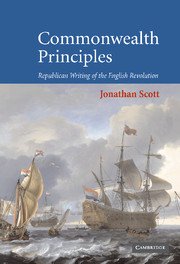Book contents
- Frontmatter
- Contents
- Preface
- Introduction: English republicanism
- Part I CONTEXTS
- Part II ANALYSIS
- Part III Chronology
- 11 Republicans and Levellers, 1603–1649
- 12 The English republic, 1649–1653
- 13 Healing and settling, 1653–1658
- 14 The good old cause, 1658–1660
- 15 Anatomies of tyranny, 1660–1683
- 16 Republicans and Whigs, 1680–1725
- Appendix: ‘a pretty story of horses’ (May 1654)
- Bibliography
- Index
13 - Healing and settling, 1653–1658
Published online by Cambridge University Press: 22 September 2009
- Frontmatter
- Contents
- Preface
- Introduction: English republicanism
- Part I CONTEXTS
- Part II ANALYSIS
- Part III Chronology
- 11 Republicans and Levellers, 1603–1649
- 12 The English republic, 1649–1653
- 13 Healing and settling, 1653–1658
- 14 The good old cause, 1658–1660
- 15 Anatomies of tyranny, 1660–1683
- 16 Republicans and Whigs, 1680–1725
- Appendix: ‘a pretty story of horses’ (May 1654)
- Bibliography
- Index
Summary
By shewing that a Commonwealth was a Government of Laws, and not of the Sword, he could not but detect the violent administration of the Protector by his Bashaws, Intendants, or Majors General … while the Cavaliers on the other side tax'd him with Ingratitude to the memory of the late King … To these he answer'd, that … the Monarchy being now quite dissolv'd, and the Nation in a state of Anarchy … he was … oblig'd as a good Citizen to … [shew] his Countreymen … such a Model of Government as he thought most conducing to their Tranquillity, Wealth, and Power: That the Cavaliers ought of all People to be best pleas'd with him, since if his Model succeeded, they were sure to injoy equal Privileges with others, and to be deliver'd from their present Oppression; for in a well constituted Commonwealth there can be no distinction of Partys, the passage to Preferment is open to Merit in all persons.
John Toland, Life of HarringtonREPUBLICAN COMPLIMENT
One theme of defences of the dissolution was not to dispute the genuineness of the Bill for a New Representative, but to focus upon the danger which would have been posed by genuinely free elections. ‘The People … being so divided and discompos'd … as the Sea after a storm … [to] permit them to a choice of their own Governours’ would have seen ‘the Nation turn'd wild into an irregular and dangerous Liberty … or reduc'd under its former Tyranny’.
- Type
- Chapter
- Information
- Commonwealth PrinciplesRepublican Writing of the English Revolution, pp. 273 - 293Publisher: Cambridge University PressPrint publication year: 2004



